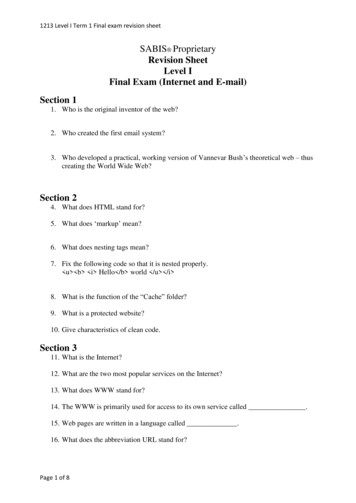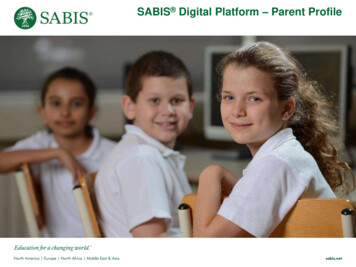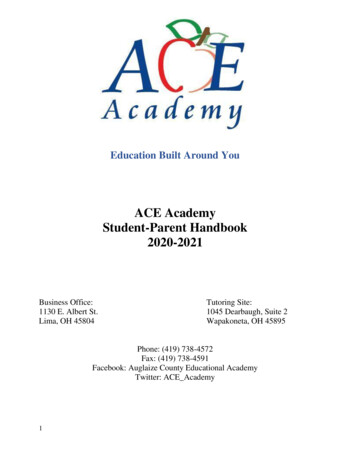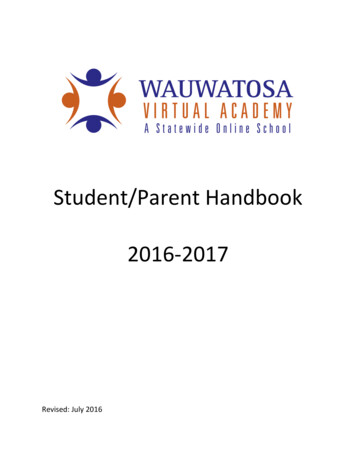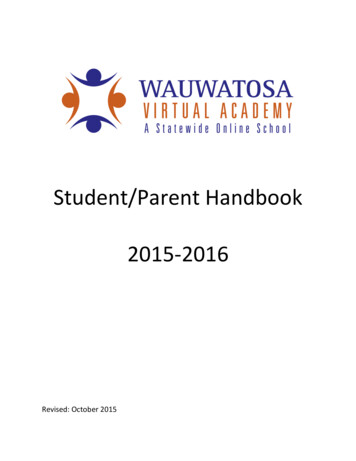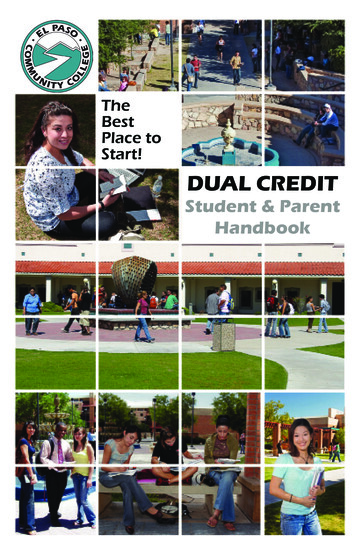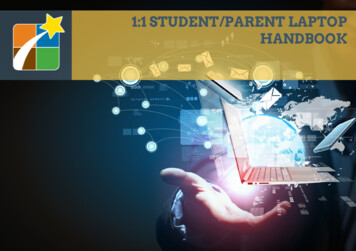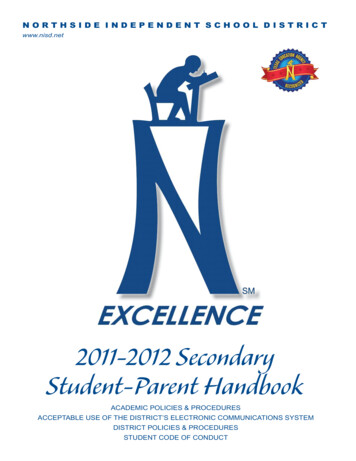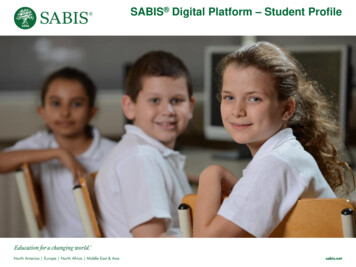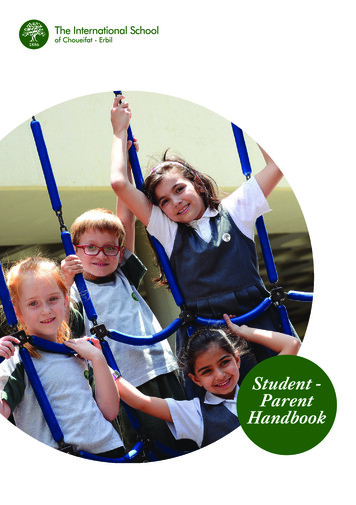
Transcription
Student ParentHandbook1
2
Welcome to the International School of Choueifat - Erbil, Kurdistan. If this is your first year at ISC-Erbil, we welcomeyou to our community. If you were with us last year, we are pleased that you decided to return.The ISC-Erbil Student-Parent Handbook is meant to serve as a guide to the operating procedures of the school. As aneducational institution, it is important for ISC-Erbil to explain its procedures and outline its expectations as clearly aspossible from the beginning. This handbook is the means to achieve this purpose. It should be read thoroughly as studentswill be required to be familiar with its contents from their first week of school. If there are any questions left unansweredby this handbook, please do not hesitate to contact the school administration. Newsletters updating this Handbook, whennecessary, will be issued by the administration during the school year.We, at ISC-Erbil, are proud of the school which we all have worked hard to create. We welcome you to join us in thechallenge of making education here a worthwhile experience. In the process, we hope you will also come to share in ourpride.Sincerely,The Administration3
Table ofContentsI.IntroductionA. Mission StatementB. Academic GoalsC. Non-Academic Goals1111II.BRIEF HISTORY OF THE SABIS NETWORK1III.BRIEF HISTORY OF ISC-ERBIL2IV.FEATURES OF THE SABIS EDUCATIONAL SYSTEMA. Academic SupportB. Intensive CoursesC. Study GroupsD. Peer TutoringE. AccountabilityF. Admissions RequirementsG. College Preparation for StudentsH. Cultural DiversityI. EfficiencyJ. Responsibility22222233333V.THE SCHOOL DAYA. Academic YearB. Arrival and Departure ProceduresC. Attendance and PunctualityD. Make-up WorkE. LatenessF. Skipping ClassG. Breaks44468888VI.ENROLLMENT/RE-ENROLLMENT & WITHDRAWALA. Enrollment/Re-enrollmentB. WithdrawalC. Refund PolicyD. Bus Refund Policy99910104
VII. SABIS STUDENT LIFE ORGANIZATION AT ISC-ERBILA. What is SABIS Student Life Organization B. SLO PrefectsC. SLO PeriodD. SLO PointsE. SLO in the ClassroomF. SLO Shadow Teachers G. Discipline PrefectsH. SLO Study GroupsI. Student Life ActivitiesJ. Student Life Special Events1010111112121212121313VIII. BEHAVIORA. Code of ConductB. Appropriate BehaviorsC. Inappropriate BehaviorD. Leaving CampusE. Intimate Public Display of AffectionF. If Prohibited Items are Seen During Regular School HoursG. Consequences of Inappropriate BehaviorH. Behavior DefinitionsI. JurisdictionJ. School Decisions1313131414151515161616IX.GeneralA. BoundriesB. Communicating with ParentsC. Dress CodeD. Emergency Closure of SchoolE. Food ServiceF. HomeworkG. Identification BadgeH. InternetI. Lost PropertyJ. MarkingK. MedicalL. Promotion and Retention PolicyM. Reading ProgramN. AR Accelerated ReadingO. Report CardsP. School StoreQ. StorageR. Summer SchoolS. TelephoneT. TestingU. TextbooksV. TranscriptsW. VisitorsX. SABIS 223232324LIST OF SABIS NETWORK SCHOOLS255
I. INTRODUCTIONA.Mission StatementISC-Erbil will be recognized as a provider of top-quality education to a highly diverse studentbody. It will strive to help all students achieve their full potential, prepare all students for successin college, equip them with the ability and desire for lifelong learning, and strengthen their civic,ethical, and moral values. The school will maintain high standards of efficiency and accountabilitythroughout its operation.B.Academic Goals C.Provide a well-rounded education based on the mastery of English and mathematicsEnable students to acquire a firm command of a second languageTrain students in logical reasoning and critical thinkingStrive to qualify every student for entrance into colleges/universities around the worldPrepare students to be able to sustain intellectual effort for long periodsGenerate excitement for lifelong learningNon-Academic Goals Uphold high standards of ethical, moral, and civic conductEncourage informed decisions on social issuesTeach students to defend convictions and reverse negative peer pressureEncourage participation in extracurricular activities, school management, and community workFoster tolerance, cooperation, guidance, and teamworkDevelop a true understanding of the peoples of the world through an appreciation ofdifferences as well as similarities.II. BRIEF HISTORY OF THE SABIS NETWORKThe first school in what has grown into the SABIS Network was the International School ofChoueifat, founded in 1886 in the village of Choueifat, a suburb of Beirut, Lebanon. The productof the vision, dedication, and ambition of its founders, the International School of Choueifatbegan by providing basic education for Lebanese girls. The founders were driven by the beliefthat women transmitted a culture’s values and were the force behind ensuring well-educatedchildren. Soon after starting, the school became co-educational in response to market demand.Today, the SABIS Network is a well-reputed global network consisting of several schools and oneuniversity located in 15 countries and serving close to 65,000 students.1
III. BRIEF HISTORY OF ISC-ERBILThe International School of Choueifat – Erbil opened for students in Kindergarten through Grade 5in September 2006. As a member of the SABIS Network, ISC-Erbil offered its students a high-qualityeducation in a safe, caring, and structured environment from the onset of its operation. Enrollmentdoubled in the second year of operation to 400 students, and today the school boasts an enrollment of1900 students in Kindergarten through Grade 12.In the summer of 2008, ISC-Erbil moved to a new, permanent, purpose-built campus that includesextensive indoor and outdoor athletic facilities with two indoor swimming pools as well as separateclassroom buildings for Kindergarten, Primary, and Secondary students, laboratories for the sciencesand IT, a library, cafeteria, theater, and staff accommodations. At full capacity, the campus canaccommodate 2,500 students.IV. FEATURES OF THE SABIS EDUCATIONAL SYSTEMThe mission and goals (page 1) underlay much of what is special about ISC-Erbil. What follow are someof the practices that make the SABIS Educational System at ISC-Erbil distinctive.A.Academic SupportStudents applying to enroll in ISC-Erbil must take diagnostic assessments. Those students whoare found to be behind academically are offered one of several different support programs,depending on the degree of their academic deficiencies. Students who start, for any reason, toslip backward after enrollment can also benefit from these same support programs in English,Kurdish, Arabic, and mathematics as listed below.B.Intensive Courses1Pull-out/parallel classes designed to help students catch up as quickly as possible in areas ofsignificant deficiencies.C.Study GroupsTutoring, two to three times per week, both during and after the school day, in areas of lesssevere deficiencies.D.Peer TutoringFor minor cases in need of support, the SABIS Student Life Organization (SLO ) overseesstudent-to-student support through peer tutoring.E.AccountabilityWe believe that high efficiency and good standards cannot be achieved if people are not helddirectly responsible for their actions and decisions. Hence, every individual at ISC-Erbil is heldaccountable.1Full Intensive courses will entail additional fees.2
Administrators bear the responsibility for setting, achieving, and maintaining high standards.SABIS provides the syllabi for all classes and the means to measure student attainment throughindependent assessments thus enabling the teachers to be accountable. Students are, of course,accountable as well. Their academic achievement is measured frequently, and a record of eachstudent’s involvement in activities is kept in the form of SLO points.F.Admissions RequirementsISC-Erbil is academically-oriented without being highly selective. Grade placement is determinedaccording to ability with age as a limiting factor. The admissions requirements are: Desire of parents and students for a quality education Willingness to put forth the effort required to achieve that A minimum basic knowledge of English and mathematics (as determined by the diagnosticassessments) for the students entering the Primary and Secondary divisions and – in case theydo not – the will to make up for any gaps in learning through extra help and hard work.G.College Preparation for StudentsTrue to the SABIS philosophy, ISC-Erbil strives to prepare its students to enter top collegesand universities worldwide. SABIS believes that a college education should be academicallyaccessible to most students, not only a select few. The record of college placements across theSABIS Network over more than a century bears this out.H.Cultural DiversityISC-Erbil welcomes cultural diversity in both its student body and staff. This diversity providesstudents with the experience of interacting with children and adults from many different cultures.This helps ISC-Erbil to fulfill one of its goals: “to help students develop a true understanding ofthe peoples of the world through an appreciation of their differences as well as their similarities.”I.EfficiencyAt ISC-Erbil there is a great awareness of the value of time. Efficiency is defined as accomplishmentper unit of time. When students direct their effort, they achieve more and in less time, i.e. studentsare taught to do “smart work” as opposed to “busy work.”Students are guided in the proper use of their time and they are taught how to organize themselvesand how to develop disciplined study habits. By being efficient, students have more time toparticipate in other pursuits that help to satisfy their social, physical, and aesthetic needs as wellas their intellectual needs.J.ResponsibilityThrough the SABIS Student Life Organization , a parallel, student-run administration, studentsare given opportunities to learn organizational and leadership skills. Just as in any “real-world”organization, students in SLO work their way up the hierarchy by proving themselves capableat the lower levels of the organization. These positive formative experiences in SLO enablegraduates from SABIS Network schools to become responsible leaders in their communities,countries, families, and workplaces.3
V. THE SCHOOL DAYA.Academic YearThe school year is divided into three terms. Within each term, three types of instructional days arescheduled to maximize learning: Regular Instructional Days Revision Days (1 week each for Terms I and II and 2 weeks for Term III) No new material istaught on revision days. Instead, students have an intensive and comprehensive review of thematerial required for end-of-term or final exams. Revision days have a special value. This is atime to give students an opportunity to go over what they have learned before they are finallytested. Revision is comprehensive, but selectively so. In other words, teachers and studentsneed not review every single item they have covered. Primarily, the essential concepts, facts,and skills are selected and reviewed. This is also a time when the class may go over – in moredepth – concepts taught earlier in the term and reinforce student knowledge and ability toapply what has been learned. Examination Days (4-6 days at the end of each term)B.Arrival and Departure Procedures1. Timely Arrival: The school building and playgrounds are not open to children or parentsbefore 7:40 a.m.It is important to note that the arrival schedule may be changed anytime by the administration.Parents will be notified accordingly of any changes.KG1 – Grade 1Grade 2 – 4KG to Grade 1 children mayarrive anytime between7:40 and 7:55 a.m.Grade 2 and 3 studentsmay arrive anytime between7:45 and 7:55 a.m.Parents are requested to leavechildren with the morningsupervisor.Parents are requested to leavethe students with the supervisorin the line-up area.Grade 5 – 12Secondary students mayarrive anytime between7:40 and 7:55 a.m.Secondary students should waiton the secondary line-up areauntil the 07:55 bell rings, atwhich time they should moveto their Homerooms inorder by grade.4
2. Late Arrival: Students arriving at school any time after 8:00 a.m. must first sign in at theSupervisor’s office and pick up a “Late Pass” which must be given to the teacher.3. Timely Departurea.KG1 and Grade 1: Classes end at 2:55 p.m. Parents who pick up their child(ren) maydo so from the KG building between 2:55 and 3:15 p.m. b.In case of inclement weather, KG to Grade 1 children will remain in the KG Building.Prior to departure, parents must sign out their child with both the KG Supervisor andMain Gate Security.For safety and security reasons, the KG area has one entrance and exit after 2:55p.m. Children will not be released from the Kindergarten area to any person otherthan the parents or an authorized person. If the person coming to pick up the childis not authorized to do so on the child’s security card, the identity of that person mustbe confirmed in advance by written authorization from the parents to the SupervisionOffice. E-mail authorization is acceptable, but verbal authorization is not.We kindly remind parents that the KG playground is only open to children inKG to Grade 1. Parents and siblings on the playground would interfere with oursupervision. Therefore, we ask parents who pick up their child(ren) to please leavethe playground or classroom area as soon as the staff member has signed out thechild(ren). Parents are fully responsible for supervising their child(ren) after signingout of the KG area. Parents who bring non-ISC-Erbil children onto school groundsare fully responsible for also supervising those child(ren) throughout their stay oncampus.Children arriving and/or leaving via school transportation are escorted to/fromtheir buses and the KG area by a KG staff member. Any changes in a child stransportation arrangements must be clarified in writing to the Supervision Officeimmediately so a
True to the SABIS philosophy, ISC-Erbil strives to prepare its students to enter top colleges and universities worldwide. SABIS believes that a college education should be academically accessible to most students, not only a select few. The record of college placements across the SABIS Network over more than a century bears this out.
